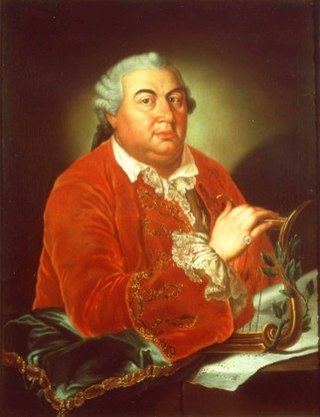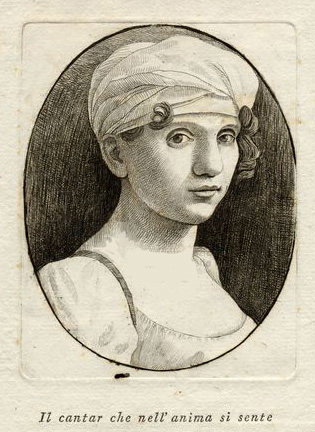Related Research Articles

Pietro Antonio Domenico Trapassi, better known by his pseudonym of Pietro Metastasio, was an Italian poet and librettist, considered the most important writer of opera seria libretti.

Niccolò Jommelli was an Italian composer of the Neapolitan School. Along with other composers mainly in the Holy Roman Empire and France, he was responsible for certain operatic reforms including reducing ornateness of style and the primacy of star singers somewhat.

Johann(es) Simon Mayr, also known in Italian as Giovanni Simone Mayr or Simone Mayr, was a German composer. His music reflects the transition from the Classical to the Romantic musical era. In 1805 he founded the Bergamo Conservatory. He was an early inspiration to Rossini and taught and advocated for Donizetti.

Caterina Gabrielli, born Caterina Fatta, was an Italian coloratura singer. She was the most important soprano of her age. A woman of great personal charm and dynamism, Charles Burney referred to her as "the most intelligent and best-bred virtuosa" that he had ever encountered. The excellence of her vocal artistry is reflected in the fact that she was able to secure long-term engagements in three of the most prestigious operatic centers in her day outside of Italy.

Rinaldo di (da) Capua was an Italian composer. Little is known of him with any certainty, including his name, although he was known to Charles Burney. He may have been the father of composer Marcello Bernardini.

Andrea Adolfati was an Italian composer who is particularly remembered for his output in the opera seria genre. His works are generally conventional and stylistically similar to the operas of his teacher Baldassare Galuppi. Although his music largely followed the fashion of his time, he did compose two tunes with unusual time signatures for his day: an air in 5
4 meter and another in 7
4 meter.
Antonio Maria Mazzoni was an Italian composer.

La Nitteti is an 18th-century Italian opera in 3 acts by the Czech composer Josef Mysliveček. It was composed to a libretto by the Italian poet Metastasio that was first performed in 1756, one of the newer of the Metastasian librettos in Mysliveček's day. For a performance in the 1770s, it would only be expected that a libretto of such age would be abbreviated and altered to suit contemporary operatic taste. This opera contains more substitutions of original aria texts than any other Mysliveček setting of a Metastasian libretto. The cuts and changes in the text made for the 1770 performance of Mysliveček's opera are not attributable. All of Mysliveček's operas are of the serious type in Italian language referred to as opera seria.

Il trionfo di Clelia is an 18th-century Italian opera in three acts by the Czech composer Josef Mysliveček composed to a libretto by the Italian poet Metastasio. It was common in the 1760s for composers to set Metastasian texts written decades before. Exceptionally, the text for Il trionfo di Clelia, first produced in Vienna in 1762, was almost new when Mysliveček was commissioned to compose his setting for Turin, and all of the aria texts used for his setting derive from the original libretto. This opera belong to the serious type in Italian language referred to as opera seria.

L'Ipermestra is an 18th-century Italian opera in 3 acts by the Czech composer Josef Mysliveček composed to the libretto Ipermestra by the Italian poet Metastasio first set by Hasse in 1744. This opera belong to the serious type in Italian language referred to as opera seria.

Antigono is an 18th-century Italian opera in 3 acts by the Czech composer Josef Mysliveček composed to a libretto by the Italian poet Metastasio first produced in 1744 with music of Johann Adolf Hasse. This opera belong to the serious type in Italian language referred to as opera seria. For a performance in the 1780s, it would only be expected that a libretto by Metastasio would be abbreviated and altered to suit contemporary operatic taste. The cuts and changes in the text made for the performance of Mysliveček's version are not attributable.

Demetrio is an eighteenth-century Italian opera in 3 acts by the Czech composer Josef Mysliveček. It was the composer's first setting of a libretto by the Italian poet Metastasio that was first performed in 1731, one of the most popular of the Metastasian librettos in Mysliveček's day. For a performance in the 1770s, it would only be expected that a libretto of such age would be abbreviated and altered to suit contemporary operatic taste. The cuts and changes in the text made for the 1773 performance of Mysliveček's opera are not attributable. All of Mysliveček's operas are of the serious type in Italian language referred to as opera seria.

Demetrio is an eighteenth-century Italian opera in 3 acts by the Czech composer Josef Mysliveček. It was the composer's second setting of a libretto by the Italian poet Metastasio that was first performed in 1731, one of the most popular of the Metastasian librettos in Mysliveček's day. For a performance in the 1770s, it would only be expected that a libretto of such age would be abbreviated and altered to suit contemporary operatic taste. The cuts and changes in the text made for the 1779 performance of Mysliveček's opera are not attributable. All of Mysliveček's operas are of the serious type in Italian language referred to as opera seria.

Elisabetta Manfredini-Guarmani was an Italian opera singer best known for having created the leading soprano roles in four of Rossini's operas, roles which he wrote specifically for her voice. She was born Antonia Elisabetta Manfredini in Bologna and was the daughter of the composer and music theorist Vincenzo Manfredini. After her stage debut in 1810 when she sang in the premiere of Stefano Pavesi's Il trionfo di Gedeone at Bologna's Teatro del Corso, she went on to perform at La Fenice, La Scala, Teatro Regio di Torino, Rome's Teatro Argentina and several other opera houses, primarily in Northern Italy. In addition to the roles she created in Rossini's operas, she also sang in the world premieres of operas by several composers who are lesser known today, including Pietro Raimondi, Simon Mayr, and Ferdinando Paër. Her last known appearance was in 1828 after which there is no further trace of her. The date and place of her death are unknown.
Innalzamento al trono del giovane re Gioas is an oratorio by Simon Mayr premiered in Florence in 1823. The anonymous libretto is unrelated to the two dozen other oratorios of the name Gioas, all of them based on the 1735 libretto Gioas re di Giuda by Metastasio.
Arianna in Nasso is an 1815 "azione drammatica", or scenic cantata in one act by Simon Mayr to a libretto by Giovanni Schmidt. It was premiered at the Teatro San Carlo, Naples, on 19 February 1815 with the role of Ariadne sung by Isabella Colbran who had requested Mayr to compose the piece for her to showcase her skills.
La Doriclea is a 1681 opera by Alessandro Stradella. The manuscript was lost, rediscovered in 1938, then lost again until its recent re-discovery.

Demetrio is an opera libretto in three acts by Pietro Metastasio. It was first performed to music composed by Antonio Caldara on 4 November 1731 during celebrations of the name day of the Holy Roman Emperor Charles VI in Vienna. Different composers later used it when composing operas named Alceste, Cleonice and Demetrio, rè della Siria. With over fifty settings it was one of Metastasio's most popular works.
Le due duchesse or La caccia dei lupi is a semiseria opera in two acts by Johann Simon Mayr to a libretto by Felice Romani which was premiered 7 November 1814 at La Scala in Milan and revived in 1819 at the Teatro San Carlo, Naples. Romani used his libretto again with a few changes for a new setting by Filippo Celli (1782–1856) for Florence on 8 September 1824.
References
- ↑ Francesco Bellotto, Giovanni Simone Mayr 1997 p298 "Che il libretto del Demetrio incontrasse l'approvazione di Mayr è fuori discussione, sia per attestazioni documentarie in questo senso che per il semplice fatto che egli accettò di musicarlo"
- ↑ "Archivmusic review". Archived from the original on 2017-06-30. Retrieved 2017-06-07.